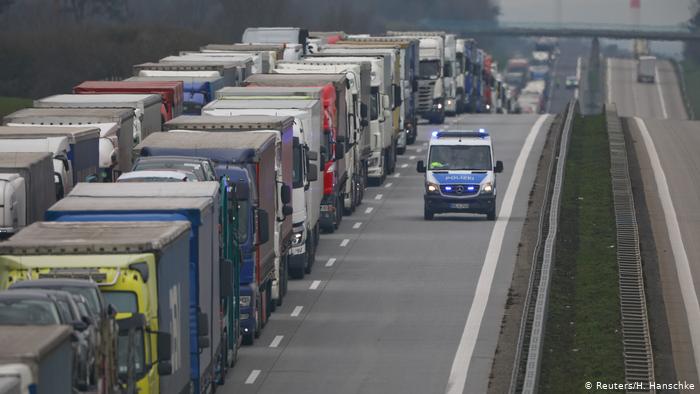The European Court of Justice has ruled that Germany's highway tolls for trucking firms are too high. Judges agreed that charges for traffic police should not be included in the bill.
The European Court of Justice (ECJ) on Wednesday ruled that Germany should not charge freight companies for the cost of traffic police on German roads.
According to the court, only infrastructure costs can be taken into account when setting tolls. These costs, it said, included charges for the operation, maintenance and expansion of the road network.
"Police activities, however, are the responsibility of state, which exercises sovereign powers and does not only act as the manager of the road infrastructure," said the court.
What is the background to the case?
A Polish haulage firm had filed a complaint about a bill for using German roads in 2010 and 2011, claiming that the charge was too high.
It said that truck tolls — which included the cost of traffic police — violated an EU directive on road charges stipulating that charges should only include infrastructure costs.
The original complaint was filed with an administrative court in Cologne, which dismissed the claim.
A higher administrative court in the German city of Münster suspended the appeal proceedings and asked the ECJ for interpretation.
The court's advocate general for the case had already advised the court that the charges for traffic police should not apply.
The ECJ last year ruled against the implementation of tolls for private non-residents on German motorways — known as "vignettes" — as these were deemed discriminatory.
What is the truck toll?
The charges on federal highways were introduced in 2005, as part of an effort to shift the burden away from taxpayers and ordinary road users. Instead, the idea was that operators of heavy vehicles that wear out the roads should pay more.
The toll applies to all trucks weighing more than 7.5 metric tons, with a differentiation in pricing depending on polluting vehicle emissions.
What does this mean?
The court in Münster — which is the higher administrative court for the state of North Rhine-Westphalia — must now issue a ruling on the Polish case. However, it is bound by the case law set by the Luxembourg judges.
Germany's Transport Ministry announced shortly before the ruling that it would take note of the court's findings. The verdict looks likely have an impact on future toll pricing.
Latest Stories
-
IPR Ghana congratulates citizens for peaceful election, calls for unity
6 minutes -
Bawumia’s 8 minutes elite ball that zapped the energy of trigger happy politicians
55 minutes -
It will be a betrayal if National Cathedral saga does not feature in ORAL’s work – Ablakwa
1 hour -
‘It’s unfortunate we had to protect the public purse from Akufo-Addo’ – Ablakwa on ORAL Team’s mission
2 hours -
Congo lawyers say Apple’s supply chain statement must be verified
2 hours -
Stampede in southwestern Nigerian city causes multiple deaths
3 hours -
Tens of thousands without water in Mayotte as curfew brought in
3 hours -
ORAL: We won’t witch-hunt, we’ll focus on transparency, not revenge – Ablakwa
3 hours -
Attempted robbery: Accused claims he carried cutlass for protection
4 hours -
Excavator operator jailed for stealing
4 hours -
African fans age-shame me for putting on some outfits – Tiwa Savage
4 hours -
Tiwa Savage criticised by female fans for stance on cheating in relationships
4 hours -
Bank of England expected to hold interest rates
4 hours -
Congo river boat sinks killing at least 22
5 hours -
Nigeria approves Shell’s $2.4 billion asset sale to Renaissance
5 hours

